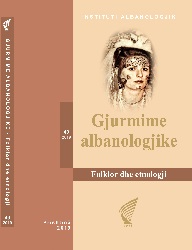LAHUTARI SOKOL MARTINI NGA MËRTURI NË FONDET ARKIVORE TË UNIVERSITETIT TË HARVARDIT (1937)
THE LUTENIST SOKOL MARTINI FROM MERTURI IN THE ARCHIVAL FUNDS OF HARVARD UNIVERSITY (1937)
Author(s): Zymer Ujkan NeziriSubject(s): Cultural history, Customs / Folklore, Ethnohistory, Oral history, Albanian Literature
Published by: Instituti Albanologjik i Prishtinës
Keywords: The Epic of the Knights; Allbert Llord; Harvard; Martyrdom; Sokol Martini;
Summary/Abstract: Albert Bates Lord was a researcher of Balkan folklore, Harvard professor, assistant of the famous American scholar of epic poetry and of Homer, Milman Parry, also a Harvard professor, in researching the Albanian epic and Slavic epic of the West Balkan (1934-1935). The province of Mertur, and its presentation in his Collection (1937) with the lutenist Sokol Martini, is very important. In 1937, Sokol told Lord that he sang 36 songs of the Warriors with lute. This was the widest repertoire that he had known in 1937 in Northern Albania. The songs collected by Sokoli contain: "The song of Muji’s marriage”, “The song of Halili’s marriage”, “The song of Muse Qesexhia", “The song of Vojkovic Alia", "The song of Ivan Kapidani". They are handwritten and are not recorded. Another distinctive feature, apart from the high poetic values and the masterly epic narrative, is the brevity of the verses, built on the legendary, the fantastic and the mythical. Topics and motifs available are same as in most repertoires of other lu tenists. Four of these songs are marriage events. In the first case, three mythical beings, namely three evil fairies, ruin Muji's wedding, by stoning the groomsmen. So we have the severe punishment of people by mythical beings, because the groomsmen had violated the order and disturbed their peace. In addition to poetic beauty, this song brings to the readers an ancient overview of people’s coexistence with mythical beings. In another case, the warrior, Halili, is determined to marry outside the tribe, endangers his life by hiding identity, shows heroism to the point of sacrifice, and finally acknowledges his true identity as a hero from Jutbina, but is also rewarded with a marriage of friendship with the daughter of the King of Hungary. The two other Sokol’s songs tare also dealing with the kidnapping of wives. In one case, the kidnapper is the King of Miskov, in the other case is the Sultan of Istanbul. Only the third song has two local heroes, one who accepts to be in services of the Sultan and the other that does not stop actions against the Sultan. They are Musa, who fights against the king, and Mark, imprisoned by the king, who accepts the arena with Musa. Sokol's shortest song has only 82 verses, while the longest song has more than 310 verses. This repertoire was also attractive to many collectors of our Epic of Warriors after the Second World War, especially to the scholar Qemal Haxhihasani.
Journal: Gjurmime Albanologjike - Folklor dhe etnologji
- Issue Year: 2019
- Issue No: 49
- Page Range: 161-191
- Page Count: 31
- Language: Albanian
- Content File-PDF

